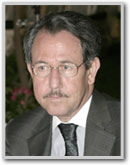Since leaving the diplomatic service Peter Ford, a former British ambassador in Damascus, has become an outspoken critic of western policies towards Syria and has described calls for President Assad to step down as "child-like".
During the conflict Ford has also repeatedly disputed evidence of atrocities by the Assad regime. Last September, when a UN humanitarian convoy was attacked in Aleppo killing 14 civilian aid workers and injuring at least 15 others, he suggested rebel fighters were responsible – even though the attack came from the air, and only Syrian and Russian air forces were operating in the area. A report by UN investigators later described the attack as "particularly egregious" and said:
"The types of munitions used, the breadth of the area targeted and the duration of the attack strongly suggest that the attack was meticulously planned and ruthlessly carried out by the Syrian air force to purposefully hinder the delivery of humanitarian aid and target aid workers, constituting the war crimes of deliberately attacking humanitarian relief personnel, denial of humanitarian aid and targeting civilians."
In February, Ford appeared in a radio programme produced by the Russian government's Sputnik News disputing a report by Amnesty International about atrocities in Saydnaya prison near Damascus. Amnesty had accused the Assad regime of carrying out mass extrajudicial killings at the prison "as part of an attack against the civilian population that has been widespread, as well as systematic, and carried out in furtherance of state policy".
Earlier this month, after bombing by the Syrian air force in Khan Sheikhoun led to dozens of people being killed by Sarin (or a similar banned substance) and hundreds more injured, Ford was again eager to exonerate the regime. Interviewed on BBC television, he told viewers it "is simply not plausible" and "it defies belief" that Assad would have used Sarin, and "he probably didn't do it".
On the same day, Ford could be seen on RT, the Russian propaganda channel, describing reports of the attack as "incredible". "It beggars belief," he said. "They [the Assad regime] had absolutely zero motive for doing it and a hundred reasons not to do it." (He has previously also spoken sympathetically about the regime on the Iranian channel Press TV.)
Meanwhile, in an unchallenging interview by former Guardian journalist Jonathan Steele, Ford told the Middle East Eye website it would be "out of character" for Assad to provoke the US by launching a chemical attack.
Promoting the interview on Twitter, Steele described Ford as "one of the bravest former ambassadors Britain has". Several other Twitter users praised Ford for his "very clear, level-headed assessment of recent events", for refuting "BBC propaganda" and dropping "truth bombs". Among others delighted by Ford's BBC interview was The Canary website which has previously hailed the Assad regime's "openness and tolerance", and which asserted "there is no evidence that Assad carried out the attack".
Ford's credentials as a former ambassador have misled some people into thinking his views on Syria are worth listening to. But what none of his many interviewers has so far mentioned (or perhaps even been aware of) is his connection with the Assad family.
Since February, Ford has been a director of the British Syrian Society which is headed by Assad's father-in-law, Fawaz Akhras.

The society, which is registered in Britain as a limited company, was founded in 2002 during a period when Assad, recently installed in power, seemed interested in reform. Numerous high-profile British figures with a background in foreign policy were happy to join it at the time.
Since the conflict broke out in Syria, however, the society has been mired in controversy – especially over Akhras's leadership. In 2012 it emerged that Akhras, a British-Syrian cardiologist and the father of Assad's wife, Asma, had been emailing advice to the president about how to rebut allegations of torture.
Records at Companies House show that no fewer than 28 people appointed at various times as directors of the society later resigned. It currently has seven directors, including Akhras and Ford. The only other British-based director is Syrian-born Ghayth Armanazi who was formerly head of the Arab League's mission in London. The remaining four directors – Ayman al-Chilabi, Costi Chehlaoui, Karim Khwanda and Omar Fouad Takla – are shown in the records as residents of Syria.
The society's published financial records are sketchy but the most recent accounts (2015) show assets of £131,000. There are no details of income and expenditure but earlier accounts show that between 2008 and 2011 it was spending on average £194,000 a year.

 RSS Feed
RSS Feed
